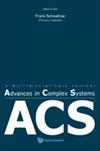A Control Approach to Guide Nonpharmaceutical Interventions in the Treatment of COVID-19 Disease Using a SEIHRD Dynamical Model
IF 1
4区 数学
Q4 MATHEMATICS, INTERDISCIPLINARY APPLICATIONS
引用次数: 0
Abstract
The recent worldwide epidemic of COVID-19 disease, for which there are no medications to cure it and the vaccination is still at an early stage, led to the adoption of public health measures by governments and populations in most of the affected countries to avoid the contagion and its spread. These measures are known as nonpharmaceutical interventions (NPIs), and their implementation clearly produces social unrest as well as greatly affects the economy. Frequently, NPIs are implemented with an intensity quantified in an ad hoc manner. Control theory offers a worthwhile tool for determining the optimal intensity of the NPIs in order to avoid the collapse of the healthcare system while keeping them as low as possible, yielding concrete guidance to policymakers. A simple controller, which generates a control law that is easy to calculate and to implement is proposed. This controller is robust to large parametric uncertainties in the model used and to some level of noncompliance with the NPIs.基于SEIHRD动态模型指导COVID-19疾病非药物干预治疗的控制方法
最近,COVID-19在世界范围内流行,没有药物可以治愈,疫苗接种仍处于早期阶段,导致大多数受影响国家的政府和民众采取了公共卫生措施,以避免传染及其传播。这些措施被称为非药物干预措施(NPIs),它们的实施显然会产生社会动荡,并对经济产生巨大影响。通常,npi是以一种特殊的方式量化的强度来实现的。控制理论为确定npi的最佳强度提供了一个有价值的工具,以避免医疗保健系统的崩溃,同时将其保持在尽可能低的水平,为政策制定者提供具体指导。提出了一种简单的控制器,生成易于计算和实现的控制律。该控制器对所使用的模型中的大参数不确定性以及与npi的某种程度的不遵从具有鲁棒性。
本文章由计算机程序翻译,如有差异,请以英文原文为准。
求助全文
约1分钟内获得全文
求助全文
来源期刊

Advances in Complex Systems
综合性期刊-数学跨学科应用
CiteScore
1.40
自引率
0.00%
发文量
121
审稿时长
6-12 weeks
期刊介绍:
Advances in Complex Systems aims to provide a unique medium of communication for multidisciplinary approaches, either empirical or theoretical, to the study of complex systems. The latter are seen as systems comprised of multiple interacting components, or agents. Nonlinear feedback processes, stochastic influences, specific conditions for the supply of energy, matter, or information may lead to the emergence of new system qualities on the macroscopic scale that cannot be reduced to the dynamics of the agents. Quantitative approaches to the dynamics of complex systems have to consider a broad range of concepts, from analytical tools, statistical methods and computer simulations to distributed problem solving, learning and adaptation. This is an interdisciplinary enterprise.
 求助内容:
求助内容: 应助结果提醒方式:
应助结果提醒方式:


